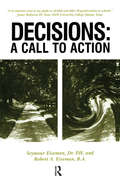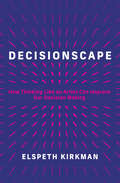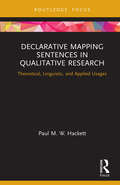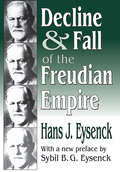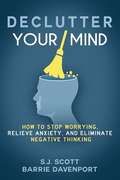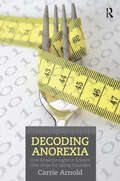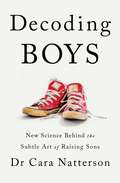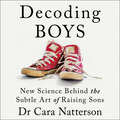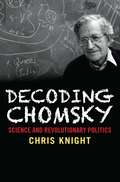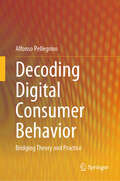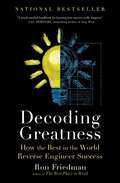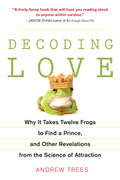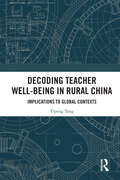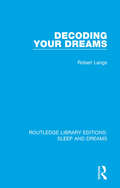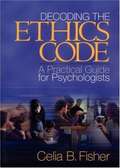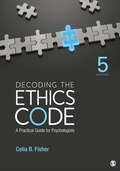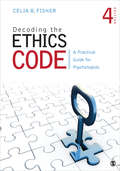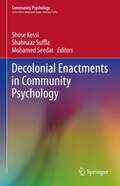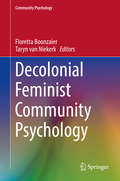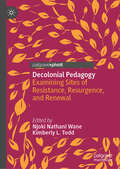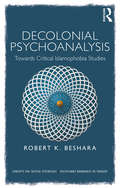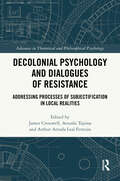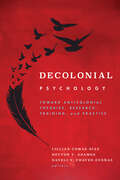- Table View
- List View
Decisions: A Call to Action
by Seymour Eiseman Robert A EisemanThis book represents a method by which students are assisted to make wise decisions about the use of alcohol and other drugs. Situations which are essential to effective daily living are employed to reach effective decisions. The role of parents in assisting the children toward a better understanding of the nature of drug use is also explored. Specifically, the use of alcohol and other drugs in the workplace places the drug situation directly in the light of the job market. The current problem of HIV and drugs is also discussed, along with drugs and pregnancy.
Decisionscape: How Thinking Like an Artist Can Improve Our Decision-Making
by Elspeth KirkmanHow thinking like an artist can improve our decision making and provide the perspective necessary to make better choices.Why are so many of our decisions regrettable, and what can we do about it? Decisionscape maps the surprising ways that our decisions are influenced and how thinking like an artist can help us deliberately arrange our perspective to make better choices. Introducing the concept of a &“decisionscape,&” Elspeth Kirkman blends art and science with insights from moral philosophy, sports, geopolitics, and elsewhere to explore decision making in a refreshingly original way. A broadly appealing and relatable book, Decisionscape asks us to confront the prejudices, blind spots, and hypocrisy in our day-to-day thinking.When we make choices, Kirkman explains, we act like an artist arranging objects on a canvas, using our system of perspective to compose a mental representation of the world. This decisionscape includes a foreground and background, a frame, a fixed viewpoint, and outside influences. Organized into four parts that unpack a different facet of the book&’s organizing principle, Decisionscape shows how psychological distance dictates what we prioritize and diminish, how the big picture can often look different from its parts, how culture and context frame decisions, and how personal worldviews alter how we interpret information. Complex, timely, and breezy, Decisionscape addresses one of the most fundamental human experiences: making better decisions to live our best life.
Declarative Mapping Sentences in Qualitative Research: Theoretical, Linguistic, and Applied Usages (Routledge Research in Psychology)
by Paul M. HackettIn this book, Hackett introduces the traditional usage of the mapping sentence within quantitative research, reviews its philosophical underpinnings, and proposes the "declarative mapping sentence" as an instrument and approach to qualitative scholarship. With a helpful glossary and a range of illustrative tables, Hackett takes the reader through a straightforward introduction to mapping sentences and their construction, before discussing declarative mapping sentences and possible future research directions. This innovative direction for social research provides a flexible structure for research domain, and it allows qualitative research results to be uniformly sorted. Declarative Mapping Sentences in Qualitative Research will be essential reading for researchers, academics, and postgraduate students in the fields of qualitative psychology and psychological methods, as well as philosophical psychology and social science research methods.
Decline and Fall of the Freudian Empire (Pelican Ser.)
by Hans EysenckHans Eysenck was one of the best-known research psychologists of the twentieth century. Respected as a prolific author, he was unafraid to address controversial topics. In Decline and Fall of the Freudian Empire, he places himself at the center of the debate on psychoanalytic theory, challenging the state of Freudian theory and modern-day psychoanalytic practice and questioning the premises on which psychoanalysis is based. In so doing, Eysenck illustrates the shortcomings of both psychoanalysis as a method of curing neurotic and psychotic behaviors, and of the theory of dreams and their interpretation. He also analyzes Freud's influence on anthropology and his alleged contributions to science.While books about Sigmund Freud and psychoanalysis abound, most have been written by followers and acolytes and are therefore uncritical, unaware of alternative theories, or written as weapons in a war of propaganda. Others are long and highly technical, and therefore valuable only to students and professionals. Decline and Fall of the Freudian Empire, on the other hand, was written with the non-professional in mind, and is for those who wish to know what modern scholarship has discovered about the truth or falsity of Freudian doctrines.Graced with an incisive new preface by Sybil Eysenck exploring her husband's motivation for writing the book, Decline and Fall of the Freudian Empire is an authoritative and convincing work that exposes the underlying contradictions in Freudian theory, as well as the limitations and errors of psychoanalysis.
Declutter Your Mind: How to Stop Worrying, Relieve Anxiety, and Eliminate Negative Thinking
by S. J. Scott Barrie DavenportFeel overwhelmed by your thoughts? Struggling with anxiety about your daily tasks? Or do you want to stop worrying about life? The truth is...We all experience the occasional negative thought. But if you always feel overwhelmed, then you need to closely examine how these thoughts are negatively impacting your lifestyle.
Decoding Anorexia: How Breakthroughs in Science Offer Hope for Eating Disorders
by Carrie ArnoldDecoding Anorexia is the first and only book to explain anorexia nervosa from a biological point of view. Its clear, user-friendly descriptions of the genetics and neuroscience behind the disorder is paired with first person descriptions and personal narratives of what biological differences mean to sufferers. Author Carrie Arnold, a trained scientist, science writer, and past sufferer of anorexia, speaks with clinicians, researchers, parents, other family members, and sufferers about the factors that make one vulnerable to anorexia, the neurochemistry behind the call of starvation, and why it’s so hard to leave anorexia behind. She also addresses:• How environment is still important and influences behaviors• The characteristics of people at high risk for developing anorexia nervosa• Why anorexics find starvation “rewarding”• Why denial is such a salient feature, and how sufferers can overcome itCarrie also includes interviews with key figures in the field who explain their work and how it contributes to our understanding of anorexia. Long thought to be a psychosocial disease of fickle teens, this book alters the way anorexia is understood and treated and gives patients, their doctors, and their family members hope.
Decoding Boys: New science behind the subtle art of raising sons
by Dr Cara NattersonThis is the ultimate guide to raising the tween/teen boy in your life. It covers everything from relationships, social media, friendships and school, dealing with topics like porn, drugs and video games, as well as physical and mental changes.Dr Natterson helps parents navigate the tricky stage of puberty - when loud, rambunctious boys often turn into silent, uncommunicative beings who slink behind closed doors. She argues that it's up to parents to improve their communication with their son and help him prepare for life as an adult, armed with the knowledge needed to become a well-rounded human being. This book looks at the dramatic shifts boys face physically, mentally, emotionally and socially, filtered through the Dr Natterson's expert medical and child development lens.'Decoding Boys debunks the widespread myth of the inscrutable teenage boy. Dr. Cara Natterson illuminates boys' inner lives, details the pressures they face from the outside world, and teaches parents how to effectively engage and support their adolescent sons. Decoding Boys is clear, wise, and eye-opening. If you're raising a boy, you need this brilliant book.'- Lisa Damour, PhD, New York Times bestselling author of Untangled and Under Pressure'Decoding Boys is the ultimate guide to help you understand and raise your boys with acceptance and perspective. Reading it is like having an empathetic, really smart friend who totally gets what you are going through and is helpful every step of the way!'- Mallika Chopra, author of Living with Intent'Decoding Boys is the book we've been waiting for! Dr. Cara Natterson tackles the topics that are difficult for parents to understand, let alone discuss with their children. She demystifies the complex science of male puberty and delivers sound advice for any adult living with-and wanting to support-an increasingly silent teenage boy.'- Louise Greenspan, M.D., coauthor of The New Puberty, How to Navigate Early Development in Today's Girls
Decoding Boys: New science behind the subtle art of raising sons
by Dr Cara NattersonThis is the ultimate guide to raising the tween/teen boy in your life. It covers everything from relationships, social media, friendships and school, dealing with topics like porn, drugs and video games, as well as physical and mental changes.Dr Natterson helps parents navigate the tricky stage of puberty - when loud, rambunctious boys often turn into silent, uncommunicative beings who slink behind closed doors. She argues that it's up to parents to improve their communication with their son and help him prepare for life as an adult, armed with the knowledge needed to become a well-rounded human being. This book looks at the dramatic shifts boys face physically, mentally, emotionally and socially, filtered through the Dr Natterson's expert medical and child development lens.'Decoding Boys debunks the widespread myth of the inscrutable teenage boy. Dr. Cara Natterson illuminates boys' inner lives, details the pressures they face from the outside world, and teaches parents how to effectively engage and support their adolescent sons. Decoding Boys is clear, wise, and eye-opening. If you're raising a boy, you need this brilliant book.'- Lisa Damour, PhD, New York Times bestselling author of Untangled and Under Pressure'Decoding Boys is the ultimate guide to help you understand and raise your boys with acceptance and perspective. Reading it is like having an empathetic, really smart friend who totally gets what you are going through and is helpful every step of the way!'- Mallika Chopra, author of Living with Intent'Decoding Boys is the book we've been waiting for! Dr. Cara Natterson tackles the topics that are difficult for parents to understand, let alone discuss with their children. She demystifies the complex science of male puberty and delivers sound advice for any adult living with-and wanting to support-an increasingly silent teenage boy.'- Louise Greenspan, M.D., coauthor of The New Puberty, How to Navigate Early Development in Today's Girls(P) 2020 Penguin Random House
Decoding Chomsky: Science and Revolutionary Politics
by Chris KnightA fresh and fascinating look at the philosophies, politics, and intellectual legacy of one of the twentieth century's most influential and controversial minds Occupying a pivotal position in postwar thought, Noam Chomsky is both the founder of modern linguistics and the world's most prominent political dissident. Chris Knight adopts an anthropologist's perspective on the twin output of this intellectual giant, acclaimed as much for his denunciations of US foreign policy as for his theories about language and mind. Knight explores the social and institutional context of Chomsky's thinking, showing how the tension between military funding and his role as linchpin of the political left pressured him to establish a disconnect between science on the one hand and politics on the other, deepening a split between mind and body characteristic of Western philosophy since the Enlightenment. Provocative, fearless, and engaging, this remarkable study explains the enigma of one of the greatest intellectuals of our time.
Decoding Digital Consumer Behavior: Bridging Theory and Practice
by Alfonso PellegrinoThis book is a call to adopt more ethical, sustainable, and consumer-focused approaches in the digital era. The focus on consumer perceptions and expectations in a digital context is particularly relevant, as it delves into the psychological and behavioral aspects of digital interactions. The chapters on digital consumption and risk, and memory in the digital world, are pivotal in understanding how digital mediums impact consumer choices and brand recall. Online persuasion, a key topic, explores ethical and effective strategies for influencing consumer behavior, emphasizing the importance of authenticity and trust. The discussion on social comparison and its implications in digital consumption underscores the psychological impact of digital platforms. The chapters on humanistic and sustainable marketing, and digital customer experience, reflect the growing importance of ethical, sustainable practices, and customer-centric approaches in building brand loyalty. The book is an essential guide for marketing professionals and students, offering a comprehensive understanding of the complex interplay between digital marketing strategies and consumer behavior.
Decoding Greatness: How the Best in the World Reverse Engineer Success
by Ron FriedmanNational Bestseller For readers of Outliers, Atomic Habits, and Deep Work, comes a game-changing approach to unlocking your greatness, using a secret strategy that&’s vaulted business titans and creative geniuses to the top of their profession.We&’ve long been taught there are two ways to succeed—either talent or practice. In Decoding Greatness, award-winning social psychologist Ron Friedman illuminates a powerful third path—one that has launched icons in a wide range of fields, from artists, writers, and chefs, to athletes, inventors, and entrepreneurs: reverse engineering. To reverse engineer is to look beyond what is evident on the surface and find a hidden structure. It&’s the ability to taste an intoxicating dish and deduce its recipe, to listen to a beautiful song and discern its chord progression, to watch your favorite film and grasp its narrative arc. &“Clear, concise, and backed by science&” (Daniel Pink, author of When), Decoding Greatness marries &“alluring stories and illuminating studies&” (Adam Grant, author of Think Again) of top performers—from Agatha Christie to Andy Warhol, Barack Obama, to Serena Williams—with groundbreaking research on pattern recognition and skill acquisition. You&’ll learn how to take apart acheivements you admire, pinpoint precisely what makes them work, and apply that knowledge to develop novel ideas and products that are uniquely your own. Bursting with unforgettable stories and actionable strategies, Decoding Greatness is an indispensable guide to learning from the best, upgrading your skills, and sparking breakthrough ideas.
Decoding Love
by Andrew TreesRead Andrew Trees's posts on the Penguin Blog. A smart, entertaining, and eye-opening look at the science of love, publishing for Valentine's Day Relationships should be so simple. You meet someone. You fall in love. You live happily every after. This "romantic story line" has shaped our thinking about relationships for centuries. But the fairy tale is deeply flawed, and researchers today are making shocking discoveries about how and why we choose the people we love. Drawing from the latest studies in economics, brain science, game theory, evolutionary psychology, and other fields, Decoding Love takes on a topic we all think we understand-how we fall in love-and illustrates that most of our assumptions are wrong. Along the way, Andrew Trees offers surprising new insights into the nature of attraction and desire, as well as an intimate look at the strange intersection of romance and the modern world of dating.
Decoding Teacher Well-being in Rural China: Implications to Global Contexts
by Yipeng TangThis book primarily investigates the factors influencing rural teacher well-being in China.By jointly using international comparable data from Teaching and Learning International Survey (TALIS) as well as China’s survey data from 29 counties of ten provinces in the mainland, this book not only illustrates the current status and influencing factors of rural teacher well-being in 43 education systems from a global perspective but also examines the urban-rural gaps on teacher well-being in China, as well as the explanatory factors in the dimensions of individual, school, and community. Moreover, this book employs the most recent methods developed in well-being literature, such as LASSO, random forests, and SVM, to enhance the data analysis. The book is valuable for international readers concerned about rural education and rural teachers in China. Researchers who focus on the frontier of well-being research will also benefit from the quantitative applications in this book.
Decoding Your Dreams: A Revolutionary Technique for Understanding Your Dreams (Routledge Library Editions: Sleep and Dreams #4)
by Robert LangsDo your dreams seem to have as much in common with real life as a funhouse mirror? Don’t be misled. Dreams contain extraordinarily reliable commentaries on the conflicts and events of everyday life. Properly interpreted, they not only illuminate your anxieties but actually show you how to alter the course of your life – and very much for the better. Dreams are so essential to our health and well-being that almost all of us create them in clusters four or five times every night. In this title, originally published in 1989, Dr Robert Langs, a psychoanalyst and dream researcher, goes far beyond standard interpretation in showing how your dreams tap the wisdom of the deep unconscious part of your mind. Through his unique and groundbreaking technique of trigger decoding, you will learn what your dreams are saying about your life, about the events you must deal with, about the problems you are trying to resolve. Dreams can be a kind of emotional camouflage, difficult and often uncomfortable to interpret. Trigger decoding not only exposes our emotional wounds, it also provides the balm for healing those wounds. In the proper decoding of dreams, there is revealed an intelligence, power, and beauty of mind that is unheard of in direct and conscious experience. Decoding Your Dreams opens a revolutionary new door to self-understanding and self-improvement.
Decoding the Ethics Code: A Practical Guide for Psychologists
by Celia B. FisherIntended to serve as a practical guide for psychologists, graduate students, consumers, and professionals in related fields, this updated second edition includes the current APA Ethical Principles of Psychologists and Code of Conduct with the 2010 amendments including a discussion of the involvement of psychologists in interrogations related to national security. It includes discussions of the rationale behind and application of each ethics code standard, and gives examples of behaviors that would be in compliance with, or in violation of, these standards. Icons mark sections relevant to specific areas outside of traditional psychology including criminal justice, health care, gender, ethnicity, education, employment, etc. Appendices include the text of the current Ethics Code as well as relevant readings on ethics and human rights, especially in regards to the use of torture. Annotation ©2011 Book News, Inc. , Portland, OR (booknews. com)
Decoding the Ethics Code: A Practical Guide for Psychologists
by Celia B. FisherRevised to reflect the latest edition of the American Psychological Association’s (APA) Ethical Principles of Psychologists and Code of Conduct, Celia B. Fisher’s acclaimed Decoding the Ethics Code Fifth Edition explains and puts into practical perspective the format, choice of wording, aspirational principles, and enforceability of the code. Providing in-depth discussions of the foundation and application of each ethical standard to the broad spectrum of scientific, teaching, and professional roles of psychologists, this unique guide helps practitioners effectively use ethical principles and standards to morally conduct their work, avoid ethical violations, and, most importantly, preserve and protect the fundamental rights and welfare of those whom they serve. This edition covers crucial and timely topics, with new sections on the impact of the COVID-19 pandemic and strategies for applying the social justice and liberation psychology moral frameworks to ethical decision making; addressing personal biases and the prejudices of those with whom psychologists work; and healing and self-care for Black, Indigenous, and People of Color psychologists, students and trainees.
Decoding the Ethics Code: A Practical Guide for Psychologists
by Celia B. FisherRevised to reflect the latest edition of the American Psychological Association’s (APA) Ethical Principles of Psychologists and Code of Conduct, Celia B. Fisher’s acclaimed Decoding the Ethics Code Fifth Edition explains and puts into practical perspective the format, choice of wording, aspirational principles, and enforceability of the code. Providing in-depth discussions of the foundation and application of each ethical standard to the broad spectrum of scientific, teaching, and professional roles of psychologists, this unique guide helps practitioners effectively use ethical principles and standards to morally conduct their work, avoid ethical violations, and, most importantly, preserve and protect the fundamental rights and welfare of those whom they serve. This edition covers crucial and timely topics, with new sections on the impact of the COVID-19 pandemic and strategies for applying the social justice and liberation psychology moral frameworks to ethical decision making; addressing personal biases and the prejudices of those with whom psychologists work; and healing and self-care for Black, Indigenous, and People of Color psychologists, students and trainees.
Decoding the Ethics Code: A Practical Guide for Psychologists
by Dr Celia B. FisherRevised to reflect the current status of scientific and professional theory, practices, and debate across all facets of ethical decision making, this latest edition of Celia B. Fisher’s acclaimed Decoding the Ethics Code: A Practical Guide for Psychologists demystifies the American Psychological Association’s (APA) Ethical Principles of Psychologists and Code of Conduct. The Fourth Edition explains and puts into practical perspective the format, choice of wording, aspirational principles, and enforceability of the code. Providing in-depth discussions of the foundation and application of each ethical standard to the broad spectrum of scientific, teaching, and professional roles of psychologists, this unique guide helps practitioners effectively use ethical principles and standards to morally conduct their work activities, avoid ethical violations, and, most importantly, preserve and protect the fundamental rights and welfare of those whom they serve.
Decoding the Ethics Code: A Practical Guide for Psychologists
by Dr Celia B. FisherRevised to reflect the current status of scientific and professional theory, practices, and debate across all facets of ethical decision making, this latest edition of Celia B. Fisher’s acclaimed Decoding the Ethics Code: A Practical Guide for Psychologists demystifies the American Psychological Association’s (APA) Ethical Principles of Psychologists and Code of Conduct. The Fourth Edition explains and puts into practical perspective the format, choice of wording, aspirational principles, and enforceability of the code. Providing in-depth discussions of the foundation and application of each ethical standard to the broad spectrum of scientific, teaching, and professional roles of psychologists, this unique guide helps practitioners effectively use ethical principles and standards to morally conduct their work activities, avoid ethical violations, and, most importantly, preserve and protect the fundamental rights and welfare of those whom they serve.
Decolonial Enactments in Community Psychology (Community Psychology)
by Mohamed Seedat Shahnaaz Suffla Shose KessiThis edited volume in the Community Psychology Book Series emphasizes applications of community psychology for disrupting dominant and hegemonic power relations. The book explores domains of work that are located within critical community psychology, as well as work that is conventionally not self-defined as community psychology but which draws on and contributes to the foundations and enactments of critical and liberatory community psychology. Specifically, the book advances conceptions and praxes for community psychology grounded within a decolonial framework. The volume heeds the call for a generation of approaches to community psychology that link local struggles to broader questions of power, identity, and knowledge production, bringing together examples of praxes from different contexts as a political project of highlighting indigenous struggles toward self-determination. Collectively, the chapters in this book embody a decolonial agenda for community psychology that foregrounds social justice; the lives and knowledges of the marginalized and oppressed; epistemic disobedience and transdisciplinarity; and decolonial aesthetics. The book is divided into two parts - Part I: Conceptions of Engagement for Community Psychology delves into the conceptual framework for a decolonial community psychology, and Part II: Modes of Enactments and Praxes for Community Psychology builds on these theoretical advancements through examples of praxis in different contexts. The audience for the book includes scholars, researchers, practitioners, activists, and students located within community psychology specifically, as well as disciplines within the health and social sciences, and arts and humanities more broadly.
Decolonial Feminist Community Psychology: Critical Perspectives From The Global South (Community Psychology)
by Floretta Boonzaier Taryn Van NiekerkThis edited volume seeks to critically engage with the diversity of feminist and post-colonial theory to counter hegemonic Western knowledge in mainstream community psychology. In doing so, it situates paradigms of thought and representation that capture the lived experiences of those in the global South. Specifically, the book takes an intersectional approach towards its reshaping of community psychology, centering African, black, postcolonial, and decolonial feminist critiques in its 1) critique of existing hegemonic Euro-American community psychology concepts, theories, and practice, 2) proposal of new feminist, indigenous, and decolonial methodological approaches, and 3) real-life examples of engagement, research, dialogue, and reflexive qualitative psychology practice. The book concludes with an agenda for theorization and research for future practice in postcolonial contexts. The volume is relevant to researchers, practitioners, and students in psychology, anthropology, sociology, public health, development studies, social work, urban studies, and women’s and gender studies across global contexts.
Decolonial Pedagogy: Examining Sites of Resistance, Resurgence, and Renewal
by Njoki Nathani Wane Kimberly L. ToddThrough innovative and critical research, this anthology inquires and challenges issues of race and positionality, empirical sciences, colonial education models, and indigenous knowledges. Chapter authors from diverse backgrounds present empirical explorations that examine how decolonial work and Indigenous knowledges disrupt, problematize, challenge, and transform ongoing colonial oppression and colonial paradigm. This book utilizes provocative and critical research that takes up issues of race, the shortfalls of empirical sciences, colonial education models, and the need for a resurgence in Indigenous knowledges to usher in a new public sphere. This book is a testament of hope that places decolonization at the heart of our human community.
Decolonial Psychoanalysis: Towards Critical Islamophobia Studies (Concepts for Critical Psychology)
by Robert BesharaIn this provocative and necessary book, Robert K. Beshara uses psychoanalytic discursive analysis to explore the possibility of a genuinely anti-colonial critical psychology. Drawing on postcolonial and decolonial approaches to Islamophobia, this book enhances understandings of Critical Border Thinking and Lacanian Discourse Analysis, alongside other theoretico-methodological approaches. Using a critical decolonial psychology approach to conceptualize everyday Islamophobia, the author examines theoretical resources situated within the discursive turn, such as decoloniality/transmodernity, and carries out an archeology of (counter)terrorism, a genealogy of the conceptual Muslim, and a Žižekian ideology critique. Conceiving of Decolonial Psychoanalysis as one theoretical resource for Critical Islamophobia Studies (CIS), the author also applies Lacanian Discourse Analysis to extracts from interviews conducted with US Muslims to theorize their ethico-political subjectivity and considers a politics of resistance, adversarial aesthetics, and ethics of liberation. Essential to any attempt to come to terms with the legacy of racism in psychology, and the only critical psychological study on Islamophobia in the United States, this is a fascinating read for anyone interested in a critical approach to Islamophobia.
Decolonial Psychology and Dialogues of Resistance: Addressing Processes of Subjectification in Local Realities (Advances in Theoretical and Philosophical Psychology)
by James Cresswell Atsushi Tajima Arthur Arruda Leal FerreiraInterweaving rich theory on dialogism, power, and resistance together with situated scenarios addressing the production of psychological knowledge, this book explores decoloniality as it interfaces with strategic fields in psychology.Current movements in global sentiment have raised important calls for decolonial action. In this volume an international set of authors come together to critically challenge power by considering how colonial mindsets develop and are retained. Drawing on dialogism inspired by Bakhtin, Vygotsky, and other leading thinkers of dialogicality, the book focuses on dialogue and how it is tied to the ability to think in ways outside colonial mindsets. It challenges approaches that run the risk of bypassing how fundamental colonialism has become for human thinking, and incorporates visions to consider how, both conceptually and methodologically, a postcolonial or decolonial psychology can be done. In so doing, it guides readers beyond the status quo to consider a program to improve psychology, formulate a new psychological culture, and bring about discussion beyond the permanent – yet generative – tension between liberating and subordinating psychologies.The book will be key reading for theoretical and critical psychology scholars and postgraduate students, particularly those interested in community engagement and decolonizing psychology. It will also be of interest to those engaged in research in Bakhtian studies, critical theory, and power studies.
Decolonial Psychology: Toward Anticolonial Theories, Research, Training, and Practice (Cultural, Racial, and Ethnic Psychology Series)
by Hector Y. Adames Lillian Comas-Díaz Nayeli Y. Chavez-DueñasThis book offers an expert synthesis of the scholarly literature on approaches to decolonial psychology, its historical foundations, education and training, and psychological practice. From its inception, psychological science and practice in the United States has been framed predominantly by Eurocentric epistemologies. As a result, oppressed people have internalized the belief that their culture and values are inferior to those of dominant groups. Infusing a decolonial lens into psychology is one way for the field to become more inclusive and relevant to the numerical majority worldwide. Decolonial psychology creates space and methods for oppressed and impoverished communities to radically imagine their existence outside of the superimposed borders of coloniality, neoliberalism, racism, and other systems of oppression. It emphasizes how people's subjectivity and connections to diverse social groups are influenced by history, context, and oppression; how these populations actively resist and survive attacks on their humanity; and how knowledge production is shaped not only by how data is interpreted but also by the questions asked. The chapters in this book provide an opportunity for readers to deepen their understanding of how colonization and coloniality impacted knowledge creation in society and the field of psychology, including thought-provoking resources that explore the subject matter. The book also underscores how coloniality continues to reverberate in many aspects of psychology today. Collectively, the authors invite readers to resist engaging in psycolonization by generating ideas and pathways to help reclaim, honor, and celebrate Indigenous ways of knowing and being. The volume offers guidance on methods to disrupt psycolonization and its epistemic violence, helping to provide a roadmap to decolonial psychology and anticolonial futures. It is time to confront the limitations of mainstream psychology. This book will help psychologists at all levels anchor their research, teaching, and practice in decolonial methods and practices.
